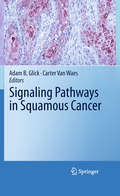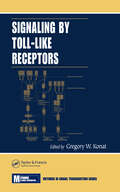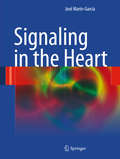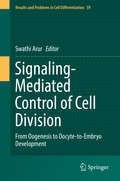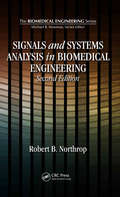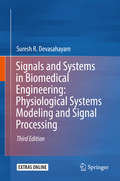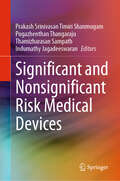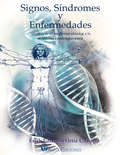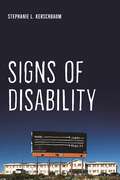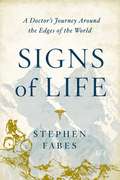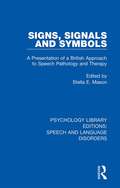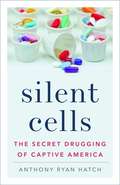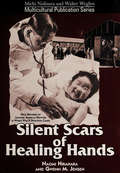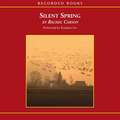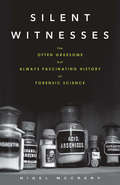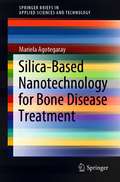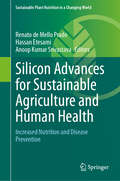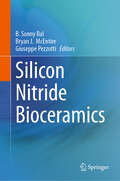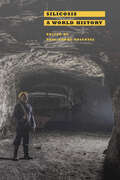- Table View
- List View
Signaling Pathways in Squamous Cancer
by Adam B. Glick Carter Van WaesSquamous epithelia form the lining surface of tissues in contact with the environment: the skin, oral mucosa, esophagus and respiratory tract, the genital tract, and several other specialized tissues. These tissues are at highest risk for exposure to environmental carcinogens such as UV, tobacco smoke and infectious agents. Cancers that form in squamous epithelia are among the most common human solid tumors and have high morbidity and mortality. These cancers include squamous cell carcinoma of the skin, oral cancer, head and neck and esophageal cancer, certain lung cancers and cervical cancer. We propose to organize the book so that the early chapters will focus on individual pathways and more specific mechanisms in both normal function and cancer, while the later chapters will be more integrative and include overviews of biomarkers and therapeutic development. This should increase interest for clinically oriented researchers. All authors will be encouraged to provide a balanced review in addition to highlighting their own work.
Signaling Through Cell Adhesion Molecules (Methods in Signal Transduction Series)
by Jun-Lin GuanThe field of signal transduction research is one of the fastest growing in all of biomedical research in recent years. Signaling through cell adhesion molecules have long been of interest because of their importance in embryonic development, homeostasis, immune responses, wound healing , and malignant transformation. However, it is only recently re
Signaling by Toll-Like Receptors
by Gregory W. KonatThe discovery of toll-like receptors (TLRs) spurred the field of innate immunity into a renaissance after many years of neglect. Since then, TLR research has grown at an exponential rate. Taking an integrated methodological approach, Signaling by Toll-Like Receptors offers a comprehensive review of important techniques in molecular biology,
Signaling in the Heart
by José Marín-GarcíaSignal transduction pathways are at the core of most biological processes and are critical regulators of heart physiology and pathophysiology. The heart is both a transmitter and dynamic receptor of a variety of intracellular and extracellular stimuli, playing a critical role of an integrator of diverse signaling mechanisms. Alterations in signaling pathways are contributing factors in the development and progression of a broad spectrum of diseases, ranging from dysrhythmias and atherosclerosis to hypertension and the metabolic syndrome. Targeting specific components of these signaling pathways has been shown to be effective in preclinical studies with significant therapeutic impact. This book brings together current knowledge in cardiovascular cell signal transduction mechanisms, advances in novel therapeutic approaches to improve cardiac function, and discussion of future directions. Presented from a post-genomic perspective, this exciting book introduces important new ideas in cardiovascular systems biology. It is an invaluable reference for cardiology researchers and practitioners.
Signaling-Mediated Control of Cell Division
by Swathi ArurThis volume covers the current knowledge base on the role of signaling and environmental pathways that control the normal development of germline stem cells, meiotic progression of oocytes, events of oocyte maturation and fertilization, and the birth of an embryo. Germ cells are uniquely poised to sustain life across generations through the fusion of oocyte and sperm. Because of the central importance of germ cells to life, much work has been dedicated to obtaining a clear understanding of the molecular and signaling events that control their formation and maintenance. Germ cells are set aside from somatic cells in the embryo and go through specialized meiotic cell cycles as the animal matures. These cell cycles are interspersed with long periods of arrest. In human females, meiosis I is initiated in the fetus. At birth, oocytes are arrested in meiosis I; after puberty, every month an oocyte initiates meiosis II - ovulation. Upon sperm availability these cells are fertilized, generate an embryo, and the cycle-of-life continues. During meiotic I progression and arrest, the fitness of oocytes and their progeny are likely influenced by environmental cues and signaling pathways. A lot of recent work has focused on understanding the mechanisms that regulate oocyte fitness and quality in humans and vertebrates. Much of our understanding on the events of meiosis I and germline stem cell populations comes from work in invertebrates, wherein the germline stem cells produce oocytes continuously through adult development. In both inverbrates and vertebrates nutritional and signaling pathways control the regulation of stem cells in such a manner so as to couple production of gametes with the nutritional availability. Additionally, mature oocytes arrest both in meiosis I and meiosis II, and signaling and nutritional pathways have been shown to regulate their formation, and maintenance, such that despite long periods of arrest, the oocyte quality is assured and errors in chromosome segregation and varied cytoplasmic events are minimal.
Signals and Systems Analysis In Biomedical Engineering (Biomedical Engineering)
by Robert B. NorthropThe first edition of this text, based on the author's 30 years of teaching and research on neurosensory systems, helped biomedical engineering students and professionals strengthen their skills in the common network of applied mathematics that ties together the diverse disciplines that comprise this field. Updated and revised to include new materia
Signals and Systems in Biomedical Engineering: Signal Processing And Physiological Systems Modeling (Topics In Biomedical Engineering Ser.)
by Suresh R. DevasahayamPhysiology is a set of processes that maintain homeostasis, and physiological measurement is a means of observing these processes. Systems theory and signal processing offer formal tools for the study of processes and measured quantities. This book shows that systems modeling can be used to develop simulations of physiological systems, which use formal relations between the underlying processes and the observed measurements. The inverse of such relations suggest signal processing tools that can be applied to interpret experimental data. Both signal processing and systems modeling are invaluable in the study of human physiology. Discussing signal processing techniques ranging from filtering and spectrum analysis to wavelet analysis, the book uses graphs and analogies to supplement the mathematics and make the book more accessible to physiologists and more interesting to engineers. Physiological systems modeling helps in both gaining insight and generating methods of analysis. This book shows how numerical computation with graphical display, haptics and multimedia can be used to simulate physiological systems. In this third edition the simulations are more closely related to clinical examination and experimental physiology than in previous editions. Detailed models of nerve and muscle at the cellular and systemic levels, and simplified models of cardiovascular blood flow provide examples for the mathematical methods and computer simulations. Several of the models are sufficiently sophisticated to be of value in understanding real world issues like neuromuscular disease. The book features expanded problem sets and a link to extra downloadable material containing simulation programs that are solutions to the theory developed in the text.
Significant and Nonsignificant Risk Medical Devices
by Prakash Srinivasan Timiri Shanmugam Pugazhenthan Thangaraju Thamizharasan Sampath Indumathy JagadeeswaranThis comprehensive resource explains the FDA's classification of devices and provides expert guidance on differentiating between significant risk and non-significant risk medical device studies. The book is divided into two parts: Significant Risk Medical Devices and Non-Significant Risk Medical Devices. Each chapter includes a general introduction and overview of the device, along with guidance on its working principles, beneficial and toxicological effects, and potential risks to the health and safety of a patient/subject. The coverage also includes reports of prior investigations on the basics of risk determination and the nature of potential harm associated with using individual devices.Significant and Non-Significant Risk Medical Devices is designed to assist practicing engineers, academic researchers, and clinical investigators in navigating the complex regulatory environment associated with medical device research and development.
Signos, síndromes y enfermedades: Un paso de la medicina clásica a la medicina contemporánea
by Erick Eduardo Ortíz UnzuetaEn la medicina actual, los síntomas y signos que integran un conjunto de síndromes, han sido parcialmente olvidados, siendo substituidos a través de las nuevas tecnologías, por una serie de estudios de laboratorio y gabinete, que amén de elevar los costos de la atención, en muchas ocasiones generan desorientación y fallan al establecer puntualmente los diagnósticos.
Signposts to Chiral Drugs
by Michael Parnham Vitomir SunjicHighlighting 15 selected chiral structures, which represent candidate or marketed drugs, and their chemical syntheses, the authors acquaint the reader with the fascinating achievements of synthetic and medicinal chemistry. The book starts with an introduction treating the discovery and development of a new drug entity. Each of the 15 subsequent chapters presents one of the target structures and begins with a description of its biological profile as well as any known molecular mechanisms of action, underlining the importance of its structural and stereochemical features. This section is followed by detailed discussions of synthetic approaches to the chiral target structure, highlighting creative ideas, the scaling-up of laboratory methods and their replacement by efficient modern technologies for large-scale production. Nearly 60 synthetic reactions, most of them stereoselective, catalytic or biocatalytic, as well as chiral separating methodologies are included in the book. Vitomir Sunjic and Michael J. Parnham provide an invaluable source of information for scientists in academia and the pharmaceutical industry who are actively engaged in the interdisciplinary development of new drugs, as well as for advanced students in chemistry and related fields.
Signs of Disability (Crip #4)
by Stephanie L. KerschbaumHow can we learn to notice the signs of disability?We see indications of disability everywhere: yellow diamond-shaped “deaf person in area” road signs, the telltale shapes of hearing aids, or white-tipped canes sweeping across footpaths. But even though the signs are ubiquitous, Stephanie L. Kerschbaum argues that disability may still not be perceived due to a process she terms “dis-attention.”To tell better stories of disability, this multidisciplinary work turns to rhetoric, communications, sociology, and phenomenology to understand the processes by which the material world becomes sensory input that then passes through perceptual apparatuses to materialize phenomena—including disability. By adding perception to the understanding of disability’s materialization, Kerschbaum significantly expands our understanding of disability, accounting for its fluctuations and transformations in the semiotics of everyday life.Drawing on a set of thirty-three research interviews focused on disabled faculty members’ experiences with disability disclosure, as well as written narratives by disabled people, this book argues for the materiality of narrative, suggesting narratives as a means by which people enact boundaries around phenomena and determine their properties. Signs of Disability offers strategies and practices for challenging problematic and pervasive forms of “dis-attention” and proposes a new theoretical model for understanding disability in social, rhetorical, and material settings.
Signs of Life: A Doctor's Journey to the Ends Of The Earth
by Stephen FabesA young doctor cycles around the world and discovers how societies treat their most vulnerable, in this thought-provoking and witty medical odysseyWhen Stephen Fabes left his job as an emergency-room doctor and set out to cycle around the world, frontline medicine quickly faded from his mind. The daily challenges of life on the road stack up as he navigates deserts—coaxing a few more miles from &‘Ol&’ Patchy&’ (his most faithful innertube)—and learns to live with the seeming constant threat posed by local wildlife, be it mangy dogs in Indonesia, grizzly bears in Alaska, or, in Australia, the common death adder, three words he was dismayed to find exist in sequence. But leaving medicine behind was not as easy as it seems. As Stephen crossed continents—on a journey that would take six years and cover more than 53,000 miles—he finds people whose health has suffered through exile, stigma, or circumstance and others, whose lives have been saved through kindness and community. After encountering a frozen body of a monk in the Himalayas, he is drawn ever more to healthcare at the margins of the world, to crumbling sanitoriums and refugee camps, to city dumps and war-torn hospital wards. In this gripping blend of true adventure and medical narrative, Stephen learns the value of listening to lives—not just solving diagnostic puzzles. Signs of Life challenges us to see care for the sick as a duty born of our compassion and our humanity.
Signs, Signals and Symbols: A Presentation of a British Approach to Speech Pathology and Therapy (Psychology Library Editions: Speech and Language Disorders)
by Stella E. MasonOriginally published in 1963, this title was an attempt to provide a new basis for the discipline of Speech Therapy. This was the first work to be published in England relating speech pathology to the wider study of human communication. It also contains results of original research into the problems of Dyslalia and Stammering. Several chapters are devoted to accounts of diagnostic measures and aids.
Sika Deer: Life History Plasticity and Management (Ecological Research Monographs)
by Koichi Kaji Hiroyuki Uno Hayato IijimaThis book provides complete and up-to-date information on sika deer biology and its management, focusing on their life history with an integrated approach of population dynamics, morphology, genetics, and evolution. The expanding distribution of sika and its increase in population in Japan and other countries are causing damage to agriculture and forestry, impacting ecosystems and affecting other species. We are facing conflicting deer issues regarding the conservation of resource values and pest control of sika deer. This contributed volume compiles new findings focusing on the ecological plasticity of the sika deer. It aims to clarify the ecological characteristics of the deer by integrating studies of different approaches and provides a perspective for their management. The book consists of six parts. Part I introduces the ecological and management background behind the history of sika deer. The following four parts discuss movement ecology (Part II), impact on vegetation and bottom-up effect on sika deer (Part III), impact on ecosystem and its resilience (Part IV), and comparison of life-history characteristics between sika deer and other ungulate species (Part V). The last part (Part VI) covers the science-based management of sika deer. Contributed by recognized experts and young researchers of sika deer, this book appeals to researchers and professionals in wildlife biology and wildlife management, evolution, population dynamics, morphology, genetics, and reproductive physiology.
Silent Cells: The Secret Drugging of Captive America
by Anthony Ryan HatchA critical investigation into the use of psychotropic drugs to pacify and control inmates and other captives in the vast U.S. prison, military, and welfare systemsFor at least four decades, U.S. prisons and jails have aggressively turned to psychotropic drugs—antidepressants, antipsychotics, sedatives, and tranquilizers—to silence inmates, whether or not they have been diagnosed with mental illnesses. In Silent Cells, Anthony Ryan Hatch demonstrates that the pervasive use of psychotropic drugs has not only defined and enabled mass incarceration but has also become central to other forms of captivity, including foster homes, military and immigrant detention centers, and nursing homes. Silent Cells shows how, in shockingly large numbers, federal, state, and local governments and government-authorized private agencies pacify people with drugs, uncovering patterns of institutional violence that threaten basic human and civil rights. Drawing on publicly available records, Hatch unearths the coercive ways that psychotropics serve to manufacture compliance and docility, practices hidden behind layers of state secrecy, medical complicity, and corporate profiteering.Psychotropics, Hatch shows, are integral to &“technocorrectional&” policies devised to minimize public costs and increase the private profitability of mass captivity while guaranteeing public safety and national security. This broad indictment of psychotropics is therefore animated by a radical counterfactual question: would incarceration on the scale practiced in the United States even be possible without psychotropics?
Silent Invasion: The Untold Story of the Trump Administration, Covid-19, and Preventing the Next Pandemic Before It's Too Late
by Deborah BirxThe definitive, inside account of the Trump Administration’s response to the Covid-19 pandemic from White House Coronavirus Response Coordinator and Coronavirus Task Force member, Dr. Deborah Birx.In late February 2020, Dr. Deborah Birx—a lifelong federal health official who had worked at the CDC, the State Department, and the US Army across multiple presidential administrations—was asked to join the Trump White House Coronavirus Task Force and assist the already faltering federal response to the Covid-19 pandemic. For weeks, she’d been raising the alarm behind the scenes about what she saw happening in public—from the apparent lack of urgency at the White House to the routine downplaying of the risks to Americans. Once in the White House, she was tasked with helping fix the broken federal approach and making President Trump see the danger this virus posed to all of us.Silent Invasion is the story of what she witnessed and lived for the next year—an eye-opening, inside account, detailed here for the first time, of the Trump Administration’s response to the greatest public health crisis in modern times. Regarded with suspicion in the West Wing from day one, Dr. Birx goes beyond the media speculation and political maneuvering to show what she was really up against in the Trump White House. Digging into the hard-fought victories, the costly mistakes, and the human drama surrounding the administration’s efforts, she examines the forces that crippled efforts to control the virus and explores why these blunders continue to haunt us today.And yet amid the agonizing missteps were bright spots that point the way forward—the fastest vaccine creation in history, governors that put their citizens’ health first, and Tribal Nations that demonstrated the powerful role of community in curbing spread, despite their criminally underfunded healthcare systems. Collectively these successes reveal the valiant work of many who were committed to saving lives, as well as highlighting the dire need to reform our public health institutions, so they are nimble and resilient enough to confront the next pandemic.With the pandemic now moving into its third year confounding two presidential administrations, Dr. Birx presents a story at once urgent and frustratingly unfinished, as Covid-19 continues to put thousands of American lives at risk. The end result is the most comprehensive and extensive accounting to date of the Trump Administration’s struggle to control the biggest health crisis in generations—a revelatory look at how we can learn from our mistakes and prevent this from happening again.
Silent Scars of Healing Hands: Oral Histories of Japanese American Doctors in World War II Detention Camps (Michi Nishiura and Walter Weglyn Multicultural Publication Series)
by Naomi Hirahara Gwenn JensenOn February 19, 1942, by order of President Franklin D. Roosevelt, all Nikkei (American born Japanese American citizens) were subject to an indiscriminate and mass incarceration that affected more than 110,000 people. Within weeks, Issei and Nisei doctors found themselves vaccinating long lines of people in anticipation of their imminent removal from homes and businesses. Cast into temporary detention, these same physicians struggled to open clinics and treat patients in facilities ill prepared for the onslaught of families, pregnant, women, elderly, and toddlers. This book is their story -- a collection of oral histories of Nisei physicians who directed health care behind barbed wires.
Silent Spring
by Rachel Carson"In 1962, when Silent Spring was first published, 'environment' was not even an entry in the vocabulary of public policy. In a few cities, especially Los Angeles, smog had become a cause of concern, albeit more because of its appearance than because of its threat to public health. Conservation--the precursor of environmentalism--had been mentioned during the 1960 Democratic and Republican conventions, but only in passing and almost entirely in the context of national parks and natural resources. And except for a few scattered entries in largely inaccessible scientific journals, there was virtually no public dialogue about the growing, invisible dangers of DDT and other pesticides and chemicals. Silent Spring came as a cry in the wilderness, a deeply felt, thoroughly researched, and brilliantly written argument that changed the course of history. Without this book, the environmental movement might have been long delayed or never have developed at all."--Introduction, p. xv.
Silent Witness: The Untold Story of Terri Schiavo's Death
by Mark FuhrmanWe all watched Terri Schiavo die. The controversy around her case dominated the headlines and talk shows, going all the way to the U.S. Supreme Court, the White House, and the Vatican. And it's not over yet. Despite her death, the controversy lingers. In Silent Witness, former LAPD detective and New York Times bestselling author Mark Fuhrman applies his highly respected investigative skills to examine the medical evidence, legal case files, and police records. With the complete cooperation of Terri Schiavo's parents and siblings, as well as their medical and legal advisers, he conducts exclusive interviews with forensics experts and crucial witnesses, including friends, family members, and caregivers. Fuhrman's findings will answer these questions: What was Terri and Michael Schiavo's marriage really like? What happened the day Terri collapsed? What did Michael Schiavo do when he discovered Terri unconscious? How long did he wait before calling 911? What do medical records show about her condition when she was first admitted to the hospital? What will the autopsy say? The legal issues and ethical questions provoked by Terri Schiavo's extraordinary case may never be resolved. But the facts about her marriage, her condition when she collapsed, and her eventual death fifteen years later can be determined. With Silent Witness, Fuhrman goes beyond the legal aspects of the case and delves into the broader, human background of Terri Schiavo's short, sad life.
Silent Witnesses: The Often Gruesome but Always Fascinating History of Forensic Science
by Nigel MccreryCrime novelist and former police officer Nigel McCrery provides an account of all the major areas of forensic science from around the world over the past two centuries. The book weaves dramatic narrative and scientific principles together in a way that allows readers to figure out crimes along with the experts. Readers are introduced to such fascinating figures as Dr. Edmond Locard, the "French Sherlock Holmes"; Edward Heinrich, "Wizard of Berkeley," who is credited with having solved more than 2,000 crimes; and Alphonse Bertillon, the French scientist whose guiding principle, "no two individuals share the same characteristics," became the core of criminal identification. Landmark crime investigations examined in depth include a notorious murder involving blood evidence and defended by F. Lee Bailey, the seminal 1936 murder that demonstrated the usefulness of the microscope in examining trace evidence, the 1849 murder of a wealthy Boston businessman that demonstrated how difficult it is to successfully dispose of a corpse, and many others.
Silica-Based Nanotechnology for Bone Disease Treatment (SpringerBriefs in Applied Sciences and Technology)
by Mariela AgotegarayThis book addresses conventional treatments of bone diseases. It proposes nanotechnological tools based on the use of silica as a bioactive material for bone. The book links the physiological and anatomical aspects of the bone with the ancestral importance of the bone system. It describes associated pathologies and conventional treatments, emphasizing their shortcomings. The book gives future perspectives and applicable tools to the development of new nanomaterials.
Silicon Advances for Sustainable Agriculture and Human Health: Increased Nutrition and Disease Prevention (Sustainable Plant Nutrition in a Changing World)
by Anoop Kumar Srivastava Hassan Etesami Renato de Mello PradoThis book addresses the most innovative topics on silicon to ensure sustainability in agriculture, including advances in nanotechnology and the impact on human health. It provides innovative information on the mineral nutrition of plants with a focus on the beneficial element silicon that has attracted the attention and interest of researchers. This is happening because silicon is the only element in plant nutrition that is capable of mitigating the greatest number of stressful events during plant cultivation. Faced with climate change associated with disease pressure due to the use of transgenic cultivars that decreases genetic variability and increases the occurrence of stress in crops. Associated with this, there is a need to reduce the use of chemical pesticides in crops to favor agro-environmental sustainability and thus increases the need for the use of silicon in agriculture. This is important because the main goal of plant mineral nutrition is to meet the demand of the plant and consequently of man and his nutritional requirements, but there is a lack of work to integrate the benefits of Si in plants and consequently its reflections on human health. The information in this work will drive further research to expand knowledge and the benefits of Si in sustainable agriculture and human health, and therefore, the target audience would be researchers, professors, students from universities and research institutes, as well as company technicians.
Silicon Nitride Bioceramics
by B. Sonny Bal Bryan J. McEntire Giuseppe PezzottiThis book offers a comprehensive exploration of silicon nitride biomaterials, encompassing both established and emerging applications. Key topics include a foundational overview of biomaterials, followed by an in-depth examination of silicon nitride's structure, bulk properties, processing techniques, surface chemistry, and its critical functionalities: osteoconductivity and antipathogenicity. The text delves into silicon nitride biocomposites and coatings, exploring their potential in various fields. Dedicated chapters address the use of silicon nitride in spinal surgery and total joint arthroplasty, providing valuable insights. Additionally, a critical comparison between silicon nitride and zirconia-toughened alumina is presented. The book concludes with a discussion of silicon nitride's promising future applications within dentistry and other emerging fields. This comprehensive resource serves as an ideal reference for ceramic scientists, students, orthopedic and neurosurgeons, and professionals in the orthopedic implant industry seeking to expand their knowledge of silicon nitride biomaterials and their diverse applications. This book also: Provides the latest research on and applications of silicon nitride biomaterials for spine surgery and additive manufacturing Broadens reader understanding of silicon nitride composites and the antimicrobial properties of silicon nitride Thoroughly details the surface chemistry of silicon nitride in artificial joint environments and future applications of silicon nitride biomaterials
Silicosis: A World History
by Paul-André RosentalThe most comprehensive book to date on the history of silicosis and the strategies used to combat it.Despite the common perception that "black lung" has been relegated to the dustbin of history, silicosis remains a crucial public health problem that threatens millions of people around the world. This painful and incurable chronic disease, still present in old industrial regions, is now expanding rapidly in emerging economies around the globe. Most industrial sectors—including the metallurgical, glassworking, foundry, stonecutting, building, and tunneling industries—expose their workers to lethal crystalline silica dust. Dental prosthodontists are also at risk, as are sandblasters, pencil factory workers in developing nations, and anyone who handles concentrated sand squirt to clean oil tanks, build ships, or fade blue jeans.In Silicosis, eleven experts argue that silicosis is more than one of the most pressing global health concerns today—it is an epidemic in the making. Essays explain how the understanding of the disease has been shaken by new medical findings and technologies, developments in industrializing countries, and the spread of the disease to a wide range of professions beyond coal mining. Examining the global reactions to silicosis, the authors trace the history of the disease and show how this occupational health hazard first came to be recognized as well as the steps that were necessary to deal with it at that time.Adopting a global perspective, Silicosis offers comparative insights into a variety of different medical and political strategies to combat silicosis. It also analyzes the importance of transnational processes—carried on by international organizations and NGOs and sparked by waves of migrant labor—which have been central to the history of silicosis since the early twentieth century. Ultimately, by bringing together historians and physicians from around the world, Silicosis pioneers a new collective method of writing the global history of disease. Aimed at legal and public health scholars, physicians, political economists, social scientists, historians, and all readers concerned by labor and civil society movements in the contemporary world, this book contains lessons that will be applicable not only to people working on combating silicosis but also to people examining other occupational diseases now and in the future.Contributors: Alberto Baldasseroni, Francesco Carnevale, Éric Geerkens, Martin Lengwiler, Gerald Markowitz, Jock McCulloch, Joseph Melling, Julia Moses, Paul-André Rosental, David Rosner, Bernard Thomann
Silver Nanoparticle Applications
by Emilio I. Alarcon May Griffith Klas I. UdekwuExploring the synthesis, characterization, surface manipulation, electron transfer and biological activity of silver nanoparticles, this book examines the fundamentals of the properties and synthesis of these particles. With a renewed interest in silver nanoparticles, this book addresses the need to understand their potential in industrial, medical and other applications. It is divided into six chapters, each written by an expert and providing a comprehensive review of the topic while detailing recent advances made in each specific area. These topics include surface plasmon band, synthesis and characterization, Surface-enhanced Raman spectroscopy (SERS) and plasmon resonance mediated processes, photocatalysis, biomedical applications and biological activity. It also presents the current state of the art, challenges and future trends of catalysis, sensing and biomedical applications. 'Silver Nanoparticle Applications' provides an invaluable reference work and introduction for chemists, biologists, physicists and biomedical researchers who are interested in exploring the uses and applications of silver nanoparticles. It is also intended for students, researchers and professionals interested in nanotechnology.
